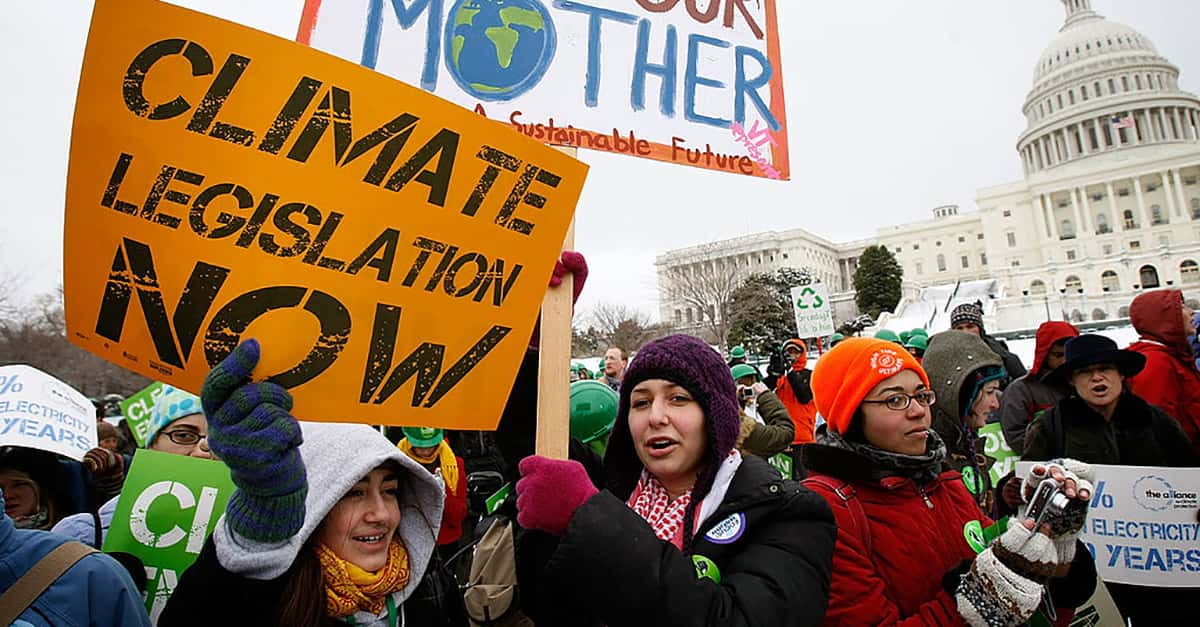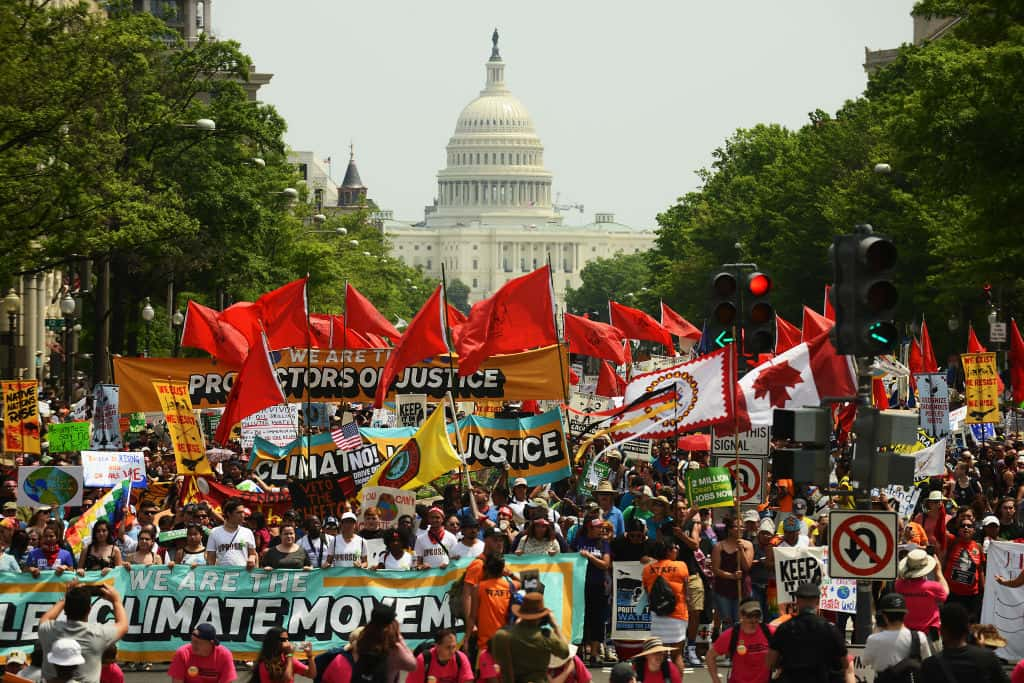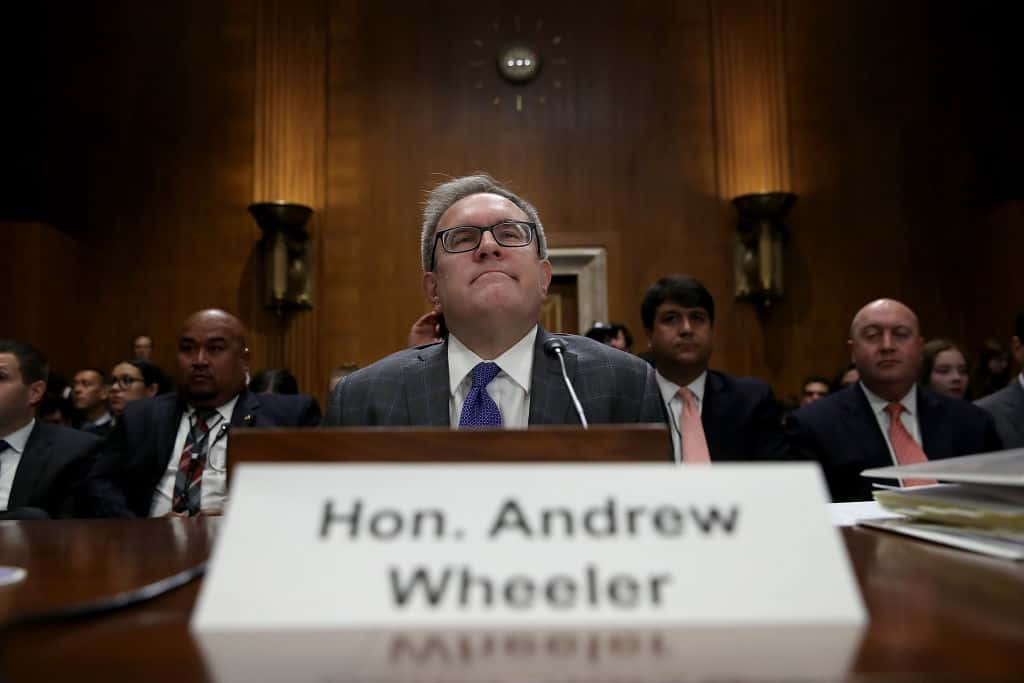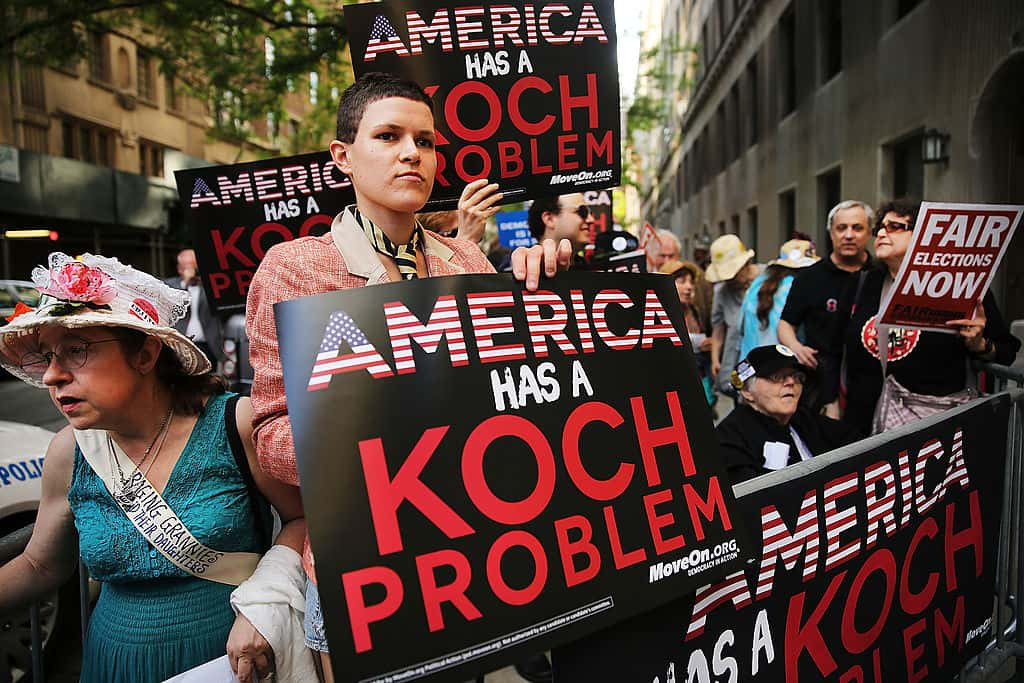Public support for the reality of climate change is growing. In the United States, more than 70% of the population believes that human-related changes to the global climate are happening now.
And yet in June 2017, the United States of America announced its intention to leave the Paris Climate Agreement. The move was nothing short of a disaster for global efforts to alleviate the incoming impacts of climate change. The United States is, after all, only behind China when it comes to the worst emitters of greenhouse gases in the world.
The response to the administration's decision was swift and concrete. In the following days, the governments of over 80 sovereign nations condemned the move. Domestically, 23 states (and Puerto Rico) came together to form the US Climate Alliance, with the goal of directly opposing the administration’s moves away from climate action. Justifying their decision, American officials argued that the agreement would have put the US at an economic disadvantage and that leaving would help to protect American workers. Meanwhile, polls showed that 69% of the American voting public supported remaining in the Paris Agreement.
In a democracy, the policies of the elected government are supposed to reflect the will of the voting population. Why then would elected officials of the United States support the country’s withdrawal from the most important climate agreement (perhaps the most important international agreement of any kind) in human history?
The answer, of course, is money. Money that flows from the coffers of corporate interests directly profiting from the destruction of our environment, into the pockets of corrupt officials with the power to prevent serious action on the most deadly known threat to human survival.
Scorched Earth
Andrew Wheeler is the 15th Administrator of the United States Environmental Protection Agency (EPA). The EPA, as its name would indicate, is charged with the protection of human and environmental health within the United States. In 2019, one would be excused for thinking that the goal would involve combating climate change on every possible front. After all, Earth’s climate is changing. Rapidly. For the worse. As noted by NASA, “Multiple studies published in peer-reviewed scientific journals show that 97 percent or more of actively publishing climate scientists agree: Climate-warming trends over the past century are extremely likely due to human activities.”
Yet the evidence suggests that Andrew Wheeler, the EPA’s head, doesn’t actually believe in human-caused climate change. He’s described the USA as the “gold standard for environmental progress.”
Until 2017, Wheeler served as a lobbyist for Murray Energy—the largest private coal company in the US. Burning coal, it should be noted, is widely considered to be the single most harmful global activity when it comes to the environmental health of our planet. A massive amount of worldwide CO2 emissions come from burning coal. Since becoming director of the EPA, Wheeler has acted on a list of proposed changes, written by Murray Energy, which while supposedly serve to protect the coal industry.
Andrew Wheeler is just one piece of a shady and lucrative network of climate change deniers who profit directly from their refusal to embrace scientific consensus.
Factinate Video of the Day
Koch Industries
Koch Industries is the second-largest private company in the United States. It rakes in more than $110 billion every year. Much of the conglomerate’s wealth is based on industries relying on fossil fuel extraction, either directly (oil refineries and pipelines) or indirectly (pulp and paper giant Georgia-Pacific).
For years, the Koch brothers, Charles and David have used their nearly inexhaustible resources to fund political influencers with interests in line with those of their business. As investors in the fossil fuel industry, much of that political activity has (unsurprisingly) been focused on climate change. Spoiler: they remain unconvinced by the science.
The brothers funnel money into political action through three primary vehicles: the Charles Koch Foundation; the David H. Koch Charitable Foundation; and the Knowledge and Progress Fund. These organizations, in turn, give money to Donors Trust and Donors Capital Fund, two political funding organizations that, according to The Guardian, “used a secretive funding route to channel nearly $120m to more than 100 groups casting doubt about the science behind climate change.”
Bloomberg reports that from 1999 to 2003, Koch Industries was assessed "more than $400 million in fines, penalties, and judgments".[24] Daniel Indiviglio, in a reaction piece appearing in The Atlantic argues that the Bloomberg article is biased and misleading, asserting that the Bloomberg team "only found eight instances of alleged misconduct by a giant multinational over the span of 63 years".[68]
Koch Family Foundations have spent $127,006,756 directly financing 92 groups that have attacked climate change science and policy solutions, from 1997–2017.
Manufacturing Doubt
In 1988, the American political philosopher (and noted critic of US policy) Noam Chomsky published Manufacturing Consent, in which he argued American mass media “are effective and powerful ideological institutions that carry out a system-supportive propaganda function, by reliance on market forces, internalized assumptions, and self-censorship, and without overt coercion."
The efforts of corporate interests to influence American climate policy reflect Chomsky’s thesis. Through a carefully conducted campaign of political lobbying and media manipulation, agents with a clear profit motive have managed to keep the public dialogue in America squarely in the realm of confusion and disagreement.
That’s a bold statement, and one that, for many, may smack of political bias. The facts, however, bear it out. Massive corporations with a vested interest in the denial of climate science provide the primary funding behind much of the anti-climate-change movement. These include ExxonMobil, coal producers, and more than a few members of the Trump Administration.
Meanwhile, much of the so-called evidence used to dismiss valid concerns over climate change is fabricated, exaggerated, or misunderstood. Perhaps most famous is the Oregon Petition: a document that has circulated since the late 1990s that supposedly contains the signatures of more than 30,000 scientists, all rejecting the evidence of what was then often called global warming. The document itself does read as a blunt denial:
“We urge the United States government to reject the global warming agreement that was written in Kyoto, Japan in December 1997, and any other similar proposals. The proposed limits on greenhouse gases would harm the environment, hinder the advance of science and technology, and damage the health and welfare of mankind. There is no convincing scientific evidence that human release of carbon dioxide, methane, or other greenhouse gases is causing or will, in the foreseeable future, cause catastrophic heating of the Earth’s atmosphere and disruption of the Earth’s climate.”
However, a small amount of research quickly reveals that the scientists signed on to the Oregon Petition need not have any experience or expertise in the field of climate research. “In the words of Snopes: the only requirement to sign this petition is an undergraduate degree in any science or science-related field. It is, therefore, misleading for the signatories to be considered climate scientists or even top researchers in their field, as some suggest. In fact, based on the group’s own numbers, only 12% of the signers have degrees (of any kind) in earth, environmental, or atmospheric science.”
Nevertheless, the Oregon Petition is commonly cited by journalists or activists wishing to disprove climate change.
The Future of the Truth
Cigarettes kill. Today it’s an undisputed fact. For more than 50 years, it was an issue subject to intense controversy and debate, fueled primarily by lobbying, rigged studies, and outright lies from cigarette manufacturers like Philip Morris International. Slowly, though, the truth came out: internal memos, acknowledging the addictive and carcinogenic nature of nicotine, leaked to the public. Lawsuits were launched (and won) against Big Tobacco. Now, smoking rates in America and around the Western world are nearly one-quarter of what they were in 1965.
The story of how Big Tobacco duped the American public into pursuing an expensive and lethal past-time is criminal and depressing—but it has, at least in a sense, been put to bed. However, the tendency for powerful, corrupt corporate interests to influence public debate in the United States (and beyond) is still very much flourishing. And nowhere is that more obvious than in the ongoing profit-fueled conspiracy to spread climate change denial around the globe.
Indeed, if one needs any evidence to connect the stories of Big Tobacco and Big Energy in the United States, they need only look to the so-called “independent research institutes” that have in the past served the interests of both groups. Take, for example, The Advancement of Sound Science Coalition. It was an advisory board, based in Washington DC, founded in 1993 by Philip Morris International to “sound science” in policy decision making.” In practice, of course, that meant something else entirely. A leaked memo stated their aims more bluntly: “The overall goals of the media plan are to: (i) raise the awareness level of the use of unsound science in public policy decision making among target audiences; (ii) educate publics on the impact of this issue; and (iii) lay the groundwork and provide an environment for a successful grassroots mobilization effort to assist Phillip Morris with its issues nationally and in target states.”
The Advancement of Sound Science Coalition was an industry mouthpiece designed to change the conversation around the danger of tobacco. However, before long, the group also became interested in another issue: climate change. After receiving funding from such interests as 3M, Chevron, Dow Chemical, ExxonMobil, and General Motors, the TASSC’s founder, Steve Milloy began writing opinion pieces for Fox News with such claims as “the relationship between CO2 and temperature is logarithmic in nature—that is, as CO2 increases in the atmosphere, it absorbs less and less additional energy to produce correspondingly less and less additional warming. At some point, adding more CO2 to the atmosphere doesn’t significantly change atmospheric temperature.”
Money Versus Science
As Discover magazine wrote in 2007, “the biggest threat to science has been quietly occurring under the radar, even though it may be changing the very foundation of American innovation. The threat is money—specifically, the decline of government support for science and the growing dominance of private spending over American research.”
More than 65% of research and development in the United States is funded by private interests. Not all private interests, of course, are bad or malicious. The facts remain, however, that when scientists are beholden to corporate donors for funding, a conflict of interest might necessarily occur.
When the profit motive of a corporation is threatened, the organization will, by nature, fight back. This dynamic is often positive—it is, after all, the profit motive that drives much of the technological advancement and innovation we rely on for everyday comforts like Netflix, Amazon, or Google.
The issue, though, comes about when the corporate interest clearly conflicts with those of society at large. In the case of climate science, the risk to human health on a global scale is clear: if we continue to pollute and damage our environment at the current rate, we pose a threat to life as we know it. Fossil fuel extractors, for example, though, operate on a different timescale and with different motivations. For them, it is far more pertinent that their business remains profitable in the short-term.
The story of climate science is what happens when hard facts bump against profit and emotion. Although the public is finally swinging in the direction of acceptance, it can not be understated that significant and important action was delayed on this issue for decades through concerted and intentional campaigns of disinformation on the part of lobbyists, corporate interests, and politicians on the take.
Here’s hoping we learn from our mistakes.

















